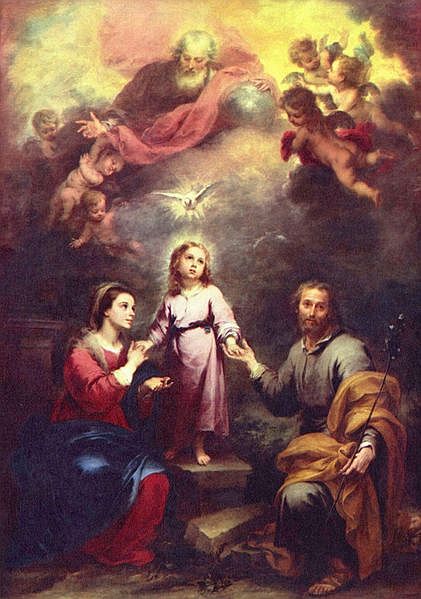Trinity

The Christian Trinity consists of God the Father, God the Son, and God the Holy Spirit, as established by the Nicene Creed of 325 AD. The Trinity refers to the three Persons in a single unity who are the one God, all co-equal, and all with one undivided divine nature forming one God.
Although it is never made explicit in the Bible, the concept of the Trinity is embraced by the Roman Catholic Church, the Orthodox Church, and nearly all Protestant denominations, and denied by all Unitarians. The name was coined by the Church Father Tertullian (145-220 AD). It is based on inferences from texts emphasizing the closeness of God-the-Father and Jesus (such as Rom. 8:31-34), the role of the Holy Ghost, and especially the baptismal formula in Matt. 28:19
- Go ye therefore, and teach all nations, baptizing them in the name of the Father, and of the Son, and of the Holy Ghost.[1]
A good illustration is H2O. It can take three forms, all of which are considered water. Another excellent non-physical illustration is the mind, which has three distinct powers of memory, understanding and will, which are not the same thing but are the essential expressions of one mind.[2] In the same way, God exists as the three distinct but united persons of one divine being, utterly unique[3].
God is the Uncreated, Holy, Good, the Perfect, All-powerful, Eternal One, fully Self-expressing and Self-expressed with Loving Self-knowledge, totally Complete, limitlessly expressing the limitless expression of limitless self-giving love. "God is love" 1 John 4:8b.
Denials
The Arians of the 4th century denied the Trinity. They were condemned as heretics and they died out, but Arian ideas appeared in Europe after 1500. Isaac Newton was secretly an Arian. By the mid-18th century Unitarianism had emerged in England, and it spread to the U.S. by 1800. It dominated schools like Harvard by 1820.
In the 20th century Jehovah's Witnesses do not believe in the Trinity, and see it as contradicting the commandment to have no god but the one God.[4] Jehovah Witnesses disparage the Trinity by depicting it as a three-headed creature and claim the doctrine as a corrupt addition by Satan to Christianity.
Islam has taught that the Trinity is Father, Son, and Mother (the Virgin Mary).
Trinity Sunday
The Trinity is remembered in worship in liturgical churches each year on Trinity Sunday, the Sunday after Pentecost. In 2013, this will be May 26.
Further reading
- Joyce, George. "The Blessed Trinity." The Catholic Encyclopedia. Vol. 15. (1912) online edition
- Kirn, O. "Trinity, Doctrine of the" in New Schaff-Herzog Encyclopedia of Religious Knowledge (1911), Vol. 12: pp18-22, Protestant interpretation
- Slovan, Gerald S. The Three Persons in One God (1964) scholarly study online edition
See also
- Arianism
- In the midst of a Maelstrom: the Holy Spirit and silence: an essay
- Johannine Comma, rejected text of John
- Seven Spirits of God
References
- ↑ The word "name" in this passage is singular. The plural word "names" is not said. Semitic peoples understood the name of something or someone was not merely a label, a sound, but the very nature of the subject as the referent. God is Trinity, but God's nature is unity, having one name, one nature.
- ↑ We can remember something we do not understand; we can understand something new which is not something we remember; and we can will to do something which does not need to be understood, which we have never done before.
- ↑ "unique" means the only one, one-of-a-kind. See Isaiah 45:21 and Isaiah 45:22
- ↑ Watchtower, July 2008

| The Godhead |
|---|

|
| God the Father God the Son God the Holy Spirit |
